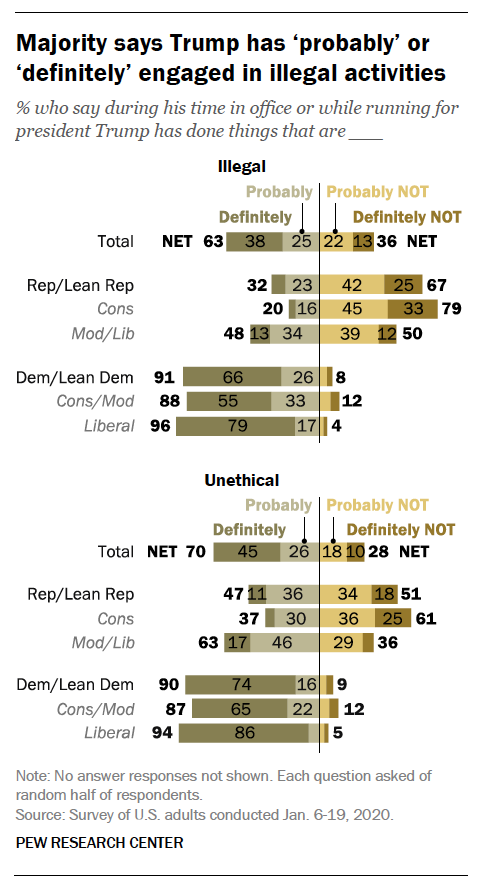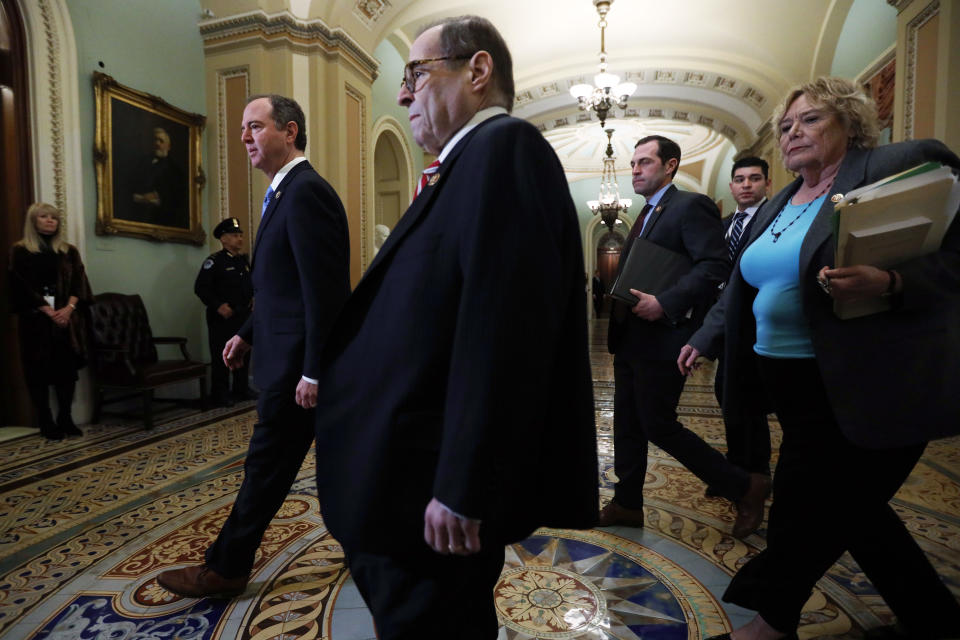America has higher standards for CEOs than for presidents
Imagine if two-thirds of Americans thought a CEO had committed a crime. Would the boss hang on to his or her job indefinitely, impervious to public opinion or criminal prosecution?
Almost certainly not. In the past year, the leaders of Boeing, WeWork, Juul, Gap, Nike, Expedia and McDonald’s quit under pressure or got fired, for reasons that fell far short of criminal behavior. CEOs serve at the pleasure of the board of directors, which they sometimes control with an iron thumb. But when there’s a management flub or personal scandal, boards can be ruthless and ditch the boss to save the company.
There’s no such standard for the president of the United States, as we are learning through President Trump’s impeachment trial. A new poll by Pew Research shows that 63% of Americans think Trump did something illegal to warrant impeachment, while 70% think he did something unethical. Yet everybody knows the Republican-controlled Senate is on its way to acquitting Trump so he can serve out the remainder of his first term, and ask voters to send him back to Washington for another one.

Then there’s the absurd Justice Department policy that says prosecutors cannot indict or prosecute a sitting president for crimes. Trump has skated on that one too, since there’s evidence he committed up to 8 crimes for campaign-finance violations, alone—including crimes his former lawyer, Michael Cohen, is in jail for. If Cohen was only the messenger in those instances—and it was Trump who literally signed the check—why is the lackey locked up while the ringmaster runs the country?
CEOs get away with a lot, and rarely do time even when there is evidence of crime. Virtually no bank CEOs faced criminal charges stemming from the financial meltdown in 2008, even when evidence showed their institutions committed fraud or other crimes. Dennis Muilenberg, who recently resigned as CEO of Boeing, is walking away with at least $60 million even though he presided over the certification of a jet, the 737 Max, with deficiencies that caused two crashes and killed 346 people.
Yet CEOs of public companies at least have to satisfy shareholders, who can be prickly and unforgiving when something goes wrong that affects the bottom line. At private companies, demigod founders go out with the trash if they screw up the company’s valuation and the potential return to venture capitalists. That’s why WeWork co-founder Adam Neumann left in 2019, and Uber’s Travis Kalanick split in 2017. If there’s one exception, it’s family-run companies that don’t have public shareholders or investors, such as… the Trump Organization.

Genius for survival
Some companies even fire the top dog for noncriminal ethical violations these days. McDonald’s fired CEO Steve Easterbrook last year for engaging in a consensual relationship with an employee that violated company policy. How quaint, compared with Trump’s record of shaking down foreign leaders for political gain, undermining U.S. national security interests and obstructing investigators trying to figure out what he’s done.
There’s a reason, in theory, the president of the United States can get away with stuff nobody else can: subjecting him to petty criminal prosecution could impair powers the president needs to run the country, especially in an emergency. With Trump exploiting that theory to the extreme, there’s good reason to reexamine it and perhaps change it with new laws. Well-run companies always survive the loss of a leader, no matter how powerful or talented. Only cult-of-personality operations tie their success to a single person.
Trump does possesses a kind of evil genius for survival. His approval rating is weak, in the low 40s, the most consistently low rating among modern presidents. But he’s the mafia don of the Republican party, where his approval rating is around 90%. Republicans only account for about 28% of the electorate, but the two-party system gives them disproportionate power in Congress. And Trump’s dominance of the party terrifies fellow Republicans, since he can effectively excommunicate them from power. This puts a floor under Trump’s support level in Congress and guarantees he’ll survive impeachment.
Voters are the shareholders in this instance, except there’s no board of directors able to hold Trump to account in their stead. The quadrennial election is the only vote these shareholders get. It’s enough to make overpaid CEOs seem humble, by comparison.
Rick Newman is the author of four books, including “Rebounders: How Winners Pivot from Setback to Success.” Follow him on Twitter: @rickjnewman. Confidential tip line: [email protected]. Encrypted communication available. Click here to get Rick’s stories by email.
Read more:
Read the latest financial and business news from Yahoo Finance
Follow Yahoo Finance on Twitter, Facebook, Instagram, Flipboard, SmartNews, LinkedIn, YouTube, and reddit.
